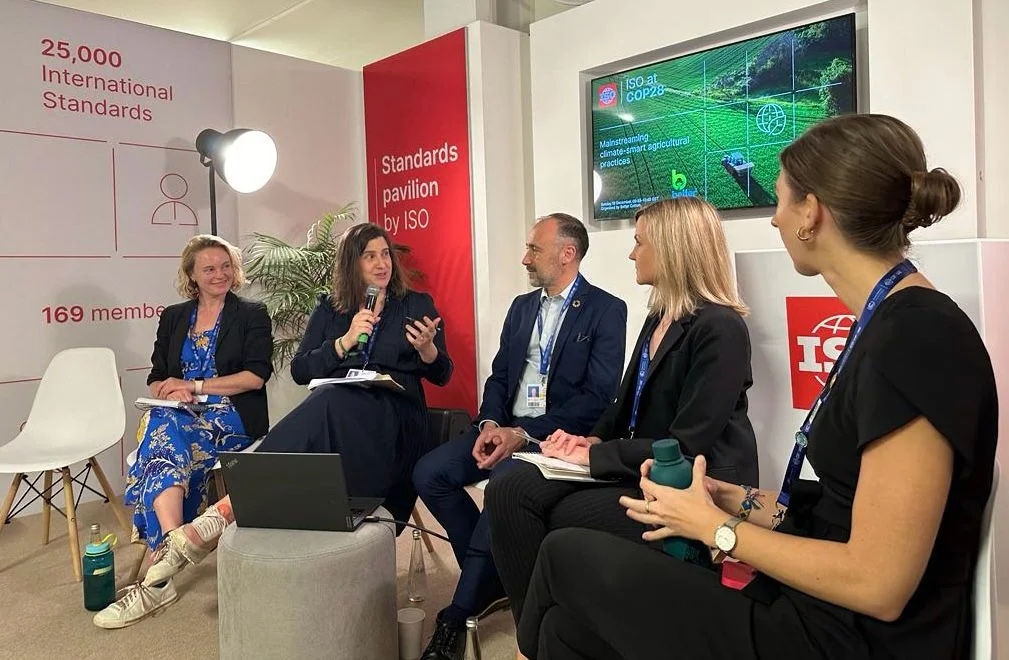
In late November, ahead of her trip to Dubai to represent Better Cotton at the 28th session of the UN Climate Change Conference of Parties (COP28), we spoke to Public Affairs Manager Lisa Ventura about our plans and objectives at the climate conference.
Now that COP28 has drawn to a close, we caught up again with Lisa to hear about her experience at the conference, the progress made, and her key takeaways.
What are your reflections on COP28?


For the first time, agriculture was a major focus at this year’s summit, with a full thematic day on 10 December. Given the contribution of agriculture to global emissions, this was a big step forward to finding solutions to climate change in a meaningful way.
Governments called for the implementation of multi-sectoral solutions on climate and agriculture, such as land use management, sustainable agriculture, resilient food systems, nature-based solutions and ecosystem-based approaches. Most importantly, they recognised that these innovative and sustainable agricultural practices create economic, social and environmental benefits, improved resilience and well-being in particular.
However, it is important to remain attentive to the focus given to food systems when COP and other climate discussions address agricultural topics. The active participation of organisations like Better Cotton is key to ensuring a balanced and integrated approach that takes into consideration all crops.
After a lot of back and forth, there is finally an agreement to transition ‘away from fossil fuels in energy systems, in a just, orderly and equitable manner’ to avert the worst effects of climate change. This transition from fossil fuels will impact every supply chain.
I’d also like to emphasise just how important COP has become for the sustainability ecosystem. All actors who wish to play their role in the future of our economic, social and environmental frameworks were present, and the Conference is driving the international agenda as a whole.
How will the UN climate negotiations at COP28 affect cotton farming and farmers around the world?
Farming communities around the world are already facing adverse impacts of climate change. Following droughts, crop yields are expected to fall significantly, resulting in diminished crop yields and overall livelihoods, and the recent floods in Pakistan and crop pests in India are just two of the recent examples of the issues impacting cotton farming.
Nevertheless, we must also bear in mind that cotton farming produces greenhouse gas emissions and that negotiations at COP are spearheading changes in agricultural systems towards more resilient and sustainable practices.
At COP28, delegates agreed to operationalise the Loss and Damage Fund, established last year at COP27, which aims to support especially vulnerable countries dealing with the effects of climate change. The decision taken in Dubai means that countries can start to pledge resources to it. This is a great starting point for the international community to find concrete means to support the livelihoods of many people, including farmers.
How did Better Cotton contribute to COP28, and what will you take forward from the conference?
Firstly, I feel a sense of pride that Better Cotton has been admitted to the United Nations Framework Convention on Climate Change (UNFCCC) as an observer organisation. This means we can attend all future sessions of COP, take part in the negotiation processes and play an important role in the global efforts to combat climate change. It also reflects Better Cotton’s role in promoting sustainable development within the international community.
Climate change can only be addressed if is it addressed holistically. To that end, we shared our climate change approach across various sessions and throughout our engagement, as it is key for cotton farming to be seen as part of the solution. For example, we hosted a side-event on how to drive the adoption of climate-smart practices in global value chains.
From the speakers of this session to farmers I met at the conference (kudos to our colleagues at Fairtrade for facilitating the participation of a delegation of farmers), climate finance was brought up time and again as the biggest gap to scale those existing tools. Greater access to resources is the only way to truly enable climate resilience and enhance smallholder livelihoods while enabling a transition to farming systems that produce sustainable crops.
We have demonstrated our commitment to inclusive collaboration and transparency by signing the United Nations’ International Trade Centre’s (ITC) ambitious ‘Uniting Sustainable Actions’ initiative, which champions the work of small- and medium-sized enterprises (SMEs) in global supply chains.
Carbon markets were also at the heart of many discussions, but government representatives did not reach an agreement on carbon trading rules (Article 6 of the Paris Agreement). As Better Cotton is developing its own GHG accounting system, it was important for us to understand how international carbon market mechanisms are being developed.
Finally, considering the significant percentage of emissions emitted by the fashion industry, I was surprised not to see more stakeholders representing this industry. There were, of course, some discussions about decarbonisation of the supply chains, but it remained on the sidelines. Greater focus on this sector is needed at COP to turn ambitious commitments from retailers and brands into legislation and measurable progress.
Going forward, we already have many ideas on how to contribute to future COPs, and are already discussing new partnerships to mobilise stakeholders in the cotton industry during these important events.







































